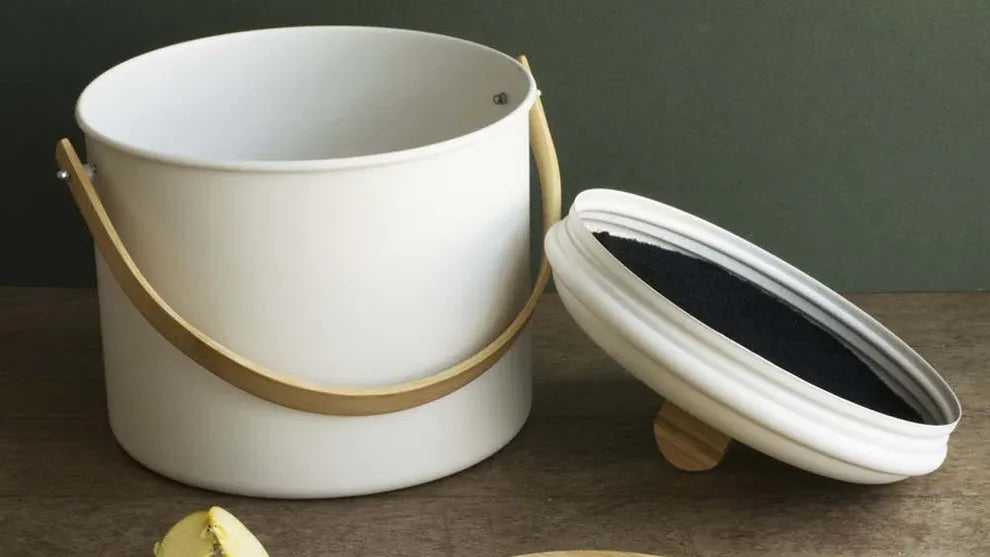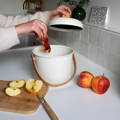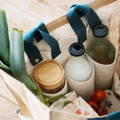
How to use leftovers to reduce food waste
Together we’re working towards making the world a slightly better place, but starting out can seem overwhelming when trying to decide the right things to do. Something that can be easily focused on is attempting to reduce our food waste. This may seem easier said than done, but some simple habits, like meal planning or repurposing leftovers, can be a huge help in keeping extra food out of the landfill and even saving you some money on your grocery trips.
Let’s chat about a few extra tips and tricks to use up your groceries and reduce your food waste.
Related: Composting 101

Tip #1 – Plan ahead
This might seem simple, but wow, does it make a world of difference? By taking the time to plan your meals for the week and creating a grocery list, you will avoid overbuying. Not only does this help the wallet, but it will significantly reduce the amount of uneaten food going to waste. Plus, when you equip yourself with cute and practical tools, like reusable cotton produce bags, and shopping totes, it can make the shopping experience more fun while helping to reduce plastic waste!
Along with creating the list, setting aside some time to meal prep will save you time during the week, make cooking much easier, and ensure that you use what you’ve purchased because there’s something oh-so-satisfying about using up a whole pack of spinach, instead of throwing it away when it gets soggy.
While many might shy away from meal prepping, it really doesn’t have to be a daunting task that monopolizes your entire Sunday. A few simple steps like washing, and, if needed, chopping up those fruits and veggies before putting them away can make a huge difference. If you want to take it a step further, precooking potential grains or marinating meats will save you time later in the week.
By cooking in advance and storing your meals in glass containers, they will be ready to go in the fridge when needed. You’ll thank yourself later when your busy week has caught up to you! Instead of reaching for your phone to order some takeout, you’ll remember you have a delicious and nutritious, fresh meal waiting for you in a matter of minutes – food that may have otherwise been thrown away.
#2 Repurposing Leftovers

The reality is, that eating leftovers doesn’t always have to be boring. Repurposing leftover ingredients or leftover meals is the perfect way to reduce your food waste and get creative in the kitchen. With a little bit of inventiveness, you’ll easily learn to turn those leftovers into delicious new meals.
For example:
- Leftover chicken can be shredded and turned into a flavorful salad topping or sandwich filling.
- Vegetables can also be sautéed and mixed into an omelet for a frittata.
- Instead of tossing your stale bread, chop it up and give it a toast to turn into croutons for salad or soup.
- If you have any vegetables that might have a slight loss in their crunch, add them to a pickling liquid to preserve and pickle them.
- If you have a lot of veggies that are not so fresh anymore, chop them up and make a veggie soup with them.
The options really are endless, and there are a lot of fun and creative ways to make new meals out of leftovers so you don’t get sick of eating the same thing every day!
Related: How to Start Composting
#3 Learn proper food storage
Proper food storage is crucial for reducing food waste and allowing your groceries to last longer. When storing food, be sure to use both your refrigerator and freezer to your advantage! Storing herbs and leafy greens in airtight containers, such as Pebbly’s stackable glass storage canisters, will keep your greens crisp and full of flavor for longer.
Let’s be honest, it’s the worst when you buy those herbs for one recipe, and they are wilted by the next day. Instead, store them correctly and use them for other (strategically) planned weeknight dinners. In addition, if they have started to wilt - blend herbs, greens, or additional aromatics, like garlic, with olive oil, then freeze them in ice cube trays. These little cubes will become your go-to in order to layer additional flavors into any meal!
Speaking of the freezer, something like leftover soup freezes perfectly and makes for a delicious and warming meal for that chilly night in. You’re way more likely to eat the leftover soup once reheated from the freezer than for three nights straight – it might be a “leftover,” but it will feel like a whole new treat!
#4 Re-organize your refrigerator
Another great way to use up what’s in your fridge is by re-organizing it. Some of us may be set in our ways, but we promise this will help.
A great place to start is by designating an “eat first” area in your fridge so that you can ensure items with a shorter shelf life are front and center. This way it’s more likely that you’ll use them up before they go bad.
Try swapping out your long-lasting condiments with your vegetables. Place the veggies on the shelves and the condiments in the drawers. As we know, condiments tend to last quite a long time, and you’ll remember they are there.
This way you can also clearly see what you have on hand instead of purchasing duplicates and tossing what’s gone off.
You can also create a section for items that are nearing the end of their freshness so you remember to use them before they expire. See where we’re going here?
#5 Understand expiration dates

It’s important to understand a bit about food safety, including expiration dates. It can be beneficial, however, if a portion of food is nearing its expiration date, be sure to check it before tossing it. If you have food that is about to expire, consider using them in recipes such as soups or sauces or make them into a meal that can be frozen for later.
If you don’t have the time to make something or have other meals planned out, consider donating any shelf-stable foods to a local food pantry. Should you feel the food has gone off (by smell, taste, or touch) compost it. If you’re new to the composting game, look up any local compost pick-up services or use them for your own personal garden.
With all of this said, reducing food waste is an important step we can all take toward a sustainable future, and an easy place to start is by ensuring our leftovers are used. Reimagining the food in new ways, as well as planning ahead, properly storing groceries, reorganizing our refrigerators, and understanding expiration dates, can all aid in using what we buy and reducing waste.
It’s the small changes that we make to our daily habits that can make a huge difference. Be sure to share these tips and tricks with your friends and family – together, we can spread knowledge and encourage others to join us in an effort to cut back on food waste!


